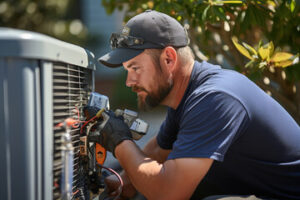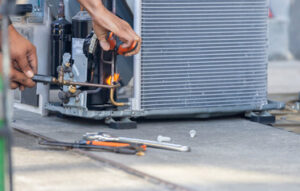Air conditioning systems cool your home by removing heat and humidity. They work by converting cold liquid refrigerant to gas, transporting it through coils where it releases the heat.

Forced air heating systems use a blower motor and ductwork to deliver conditioned heated or cooled air throughout the house. These systems prioritize comfort and energy efficiency. Contact Ausco Air Heating & Air Conditioning for professional help.
The benefits of energy efficiency include reduced utility costs, less fossil fuel use, and a smaller environmental footprint. A high-efficiency HVAC system can help you save up to 20-40 percent on cooling costs. It can also improve the resale value of your home, since new buyers will notice the efficient air conditioning.
The best energy-efficient heating and cooling systems are rated by the ENERGY STAR program, which is operated by the federal government. The ENERGY STAR label provides credible, unbiased information to consumers and businesses about the energy efficiency of products. The ratings are based on the British thermal unit (BTU), which measures the amount of heat needed to raise one pound of water by one degree Fahrenheit.
In the case of cooling, the energy-efficiency rating is EER (Energy Efficiency Ratio). The higher the rating, the more efficiently the air conditioner operates. The ENERGY STAR program also defines a minimum SEER rating that all cooling equipment must meet.
A high-efficiency air conditioner can also reduce indoor humidity levels, which can lead to mold and mildew buildup. In addition, a good-quality air conditioner uses variable-speed blowers and advanced thermostats to ensure that only the occupied rooms are cooled, which further decreases energy consumption.
As far as the heating side goes, the most efficient furnaces are gas models with an AFUE (Average Fuel Utilization Efficiency) rating of 80% or higher. Those with lower ratings waste about 20% of the fuel they burn.
Aside from being more environmentally responsible, an energy-efficient HVAC system can also prevent premature wear and tear because it does not have to work as hard. This can reduce repair expenses and extend the lifespan of your system.
An air-efficient HVAC system can also reduce household pests, such as flies and mosquitos, that thrive in warm, damp environments. These nuisances can cause health problems and may even spread disease. Investing in a new, more efficient system can eliminate these issues and protect your family from potential dangers. Energy-efficient HVACs can also reduce the demand on power plants, which means fewer greenhouse gases being released into the atmosphere.
Reduced indoor air pollutants
Our modern, energy-efficient homes are better sealed, which keeps outdoor pollutants from entering. But this also seals in indoor pollutants, including dust, pet dander, cleaning chemicals, and volatile organic compounds. These pollutants can trigger allergies, asthma and other respiratory problems. The EPA ranks indoor air pollution among the top five environmental dangers.
In order to breathe healthy, clean air, we need to eliminate these harmful chemicals from our environment. This is why air conditioning systems are designed with advanced filtration and humidity control mechanisms. This is especially important for individuals who spend a lot of time in their home or office.
One of the best ways to achieve clean, breathable air is by installing an air conditioning system. With a properly functioning AC unit, dust mites, mold, pollen, and other allergens are minimized, and the air is cooled to reduce moisture levels. All of this helps reduce the number of contaminants in the air that can cause respiratory problems and exacerbate existing health conditions.
Air conditioning also has the potential to enhance indoor air quality by reducing outdoor pollution. Particulate matter from vehicles, boilers, construction and other outdoor activities can be drawn into buildings, along with smoke, soot and other particulates. Additionally, winter inversions and wildfire smoke can make its way into buildings as well.
Humans are also major contributors to indoor air pollutants, including secondhand smoke and shedding skin cells that turn into dust mites and other allergens. Other contributing factors include cooking, cleaning and the use of aerosol sprays and strong adhesives that release carcinogens and VOCs into the air.
With Americans spending 90% of their time indoors, the health benefits of HVAC technology are significant. Besides regulating temperature and controlling humidity, HVAC systems can improve indoor air quality through filtration, ventilation, and UV control mechanisms. This is particularly important for young children, older adults and those with health conditions like heart or lung disease who are most susceptible to the effects of poor indoor air quality. Immediate reactions to poor air quality include irritation of the eyes, nose and throat, headaches, fatigue and dizziness. Long-term exposure can result in heart and lung diseases, cancer, and other serious health concerns.
Reduced maintenance
It may seem counterintuitive, but a well-maintained air conditioning system requires far less maintenance than an HVAC system that has been neglected. A regular maintenance plan allows technicians to identify and address issues before they can lead to system failures that disrupt routine activities. This reduces the risk of costly repairs or system replacement, resulting in significant cost savings for property owners, facility managers, and occupants alike.
A comprehensive maintenance plan consists of scheduled inspections, cleaning activities, and lubrication procedures. Professional technicians also perform early detection to ensure equipment is operating properly and efficiently. This prevents problems such as dirty or dusty components, overworked equipment, and improperly calibrated thermostats from causing inefficiencies and reducing energy efficiency.
In addition to reducing the likelihood of unexpected breakdowns and disruptions, regular maintenance increases the lifespan of HVAC systems. When technicians inspect equipment, they can determine if an HVAC unit is approaching the end of its lifespan or if it needs a minor repair to extend its useful life. In some cases, a regularly maintained HVAC system can be used for up to double the lifespan of a unit that has not been serviced regularly.
Many manufacturers require regular maintenance to retain warranty coverage. Professional technicians will track a maintenance schedule that is designed to meet manufacturer requirements, protecting owners from voiding warranties and incurring expensive repair or replacement costs.
In addition, a regularly maintained air conditioning system can operate at peak efficiency. This contributes to improved indoor comfort, resulting in reduced utility bills and energy costs. In fact, the One Hour Heating and Cooling Maintenance Plan offers substantial energy savings to subscribers, allowing them to save up to 30% on their monthly cooling and heating expenses.
The importance of an efficient HVAC system cannot be overstated. The system works silently in the background to guard indoor comfort, and neglecting maintenance can result in costly repair bills, high energy costs, and discomfort. The One Hour Heating and Cooling Maintenance Plan offers a comprehensive strategy to keep heating, ventilation, and air conditioning (HVAC) systems in optimal condition throughout the year.
